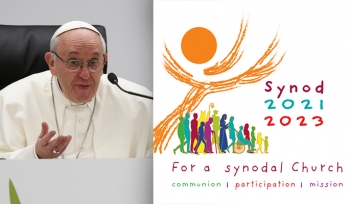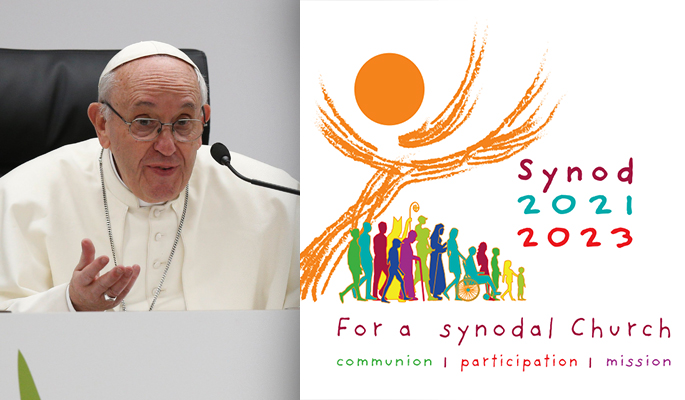
.jpg) Labour Office of the CBCI
Labour Office of the CBCI

The early Church was able to strengthen the unity of the Body of Christ, the Church, because all Christians nurtured relationships between the pastors and the faithful. We could find roots of “synodality” in the initiatives of the early Church. The ancient tradition, known as ‘Synod’, was revived by Pope (St) Paul VI in 1965, towards the conclusion of the Second Vatican Council.
The Synod was conceived by Pope Paul VI as a way to continue the collegial and shared experience of the Second Vatican Council . Following this, several Synods have taken place. For example, the first Synod – after Vatican II – was on “Evangelisation in the Modern World”, in 1974; Evangelii Nuntiandi is the fruit of this Synod. This was followed by some ‘extraordinary’ Synod Assemblies as and when the occasions called for them.
During the ceremonies commemorating the 50th anniversary of the institution of the Synod of Bishops (2015), Pope Francis expressed his desire for a common path for “laity, pastors, the Bishop of Rome.” The forthcoming Synod, “For a Synodal Church: Communion, Participation and Mission”, has to be seen in this background as it is for the first time a "decentralised" Synod is going to be held. It will be a new way of living the Synodal Journey, an integral synodal process.
Pope Francis desires that the whole Church continually lives “synodally” and wants that every baptized should be involved actively in the synod assembly. Every baptized person has a role to play in the Church, as well as in the mission of the Church in the world. Synod promotes the baptismal dignity and the call of every baptized. St Ignatius of Loyola teaches that the “Church is both, our hierarchical Mother and also the holy faithful people of God”.
Every bishop is both a teacher and a disciple: teacher when endowed with specific assistance of the Holy Spirit; and disciple when together with every baptized person, he listens to the voice of Christ speaking through the entire people of God.
The document from the General Secretariat (June 2021) states: “The fullness of the synodal process can only and truly exist if the local churches are involved in that process”. It is expected that the preparatory reflection begins in every parish of the world, moving to the diocesan, and then to the national bishops’ conferences as well as continental conferences, culminating at the Coordinating Synod Secretariat in the Holy See. Then the synod assembly will begin with formal deliberations and lasts for approximately three to four weeks”.
What does Synodality mean?
The term "synodality" is of recent origin. It is the fruit of subsequent theological reflection on the Second Vatican Council. Synodality summarises the ‘ecclesiology of communion’ emphatically expressed by the Council. It brings together the “imperatives” of co-responsibility, collaboration and genuine consultation between Church leaders and the lay faithful. It involves the active participation of all members of the Church as the Church consults, discerns and cooperates “at every level of decision making and mission”. While not intended to undermine the hierarchical structure of the Church, it is considered to be the antidote to clericalism, in turn allowing a more authentic response to the action of the Holy Spirit.
Roots of synodality and the way it necessitates the participation of the baptized in the life of the Church are found in Vatican II. When the term is applied to the Church, it is not meant to designate a mere decision-making process. It is not about collaborative decision-making that reviews alternatives, distributes responsibilities and carries out programmes. Rather it expresses fundamental characteristics of the Church’s identity: its essential communal dimension, its essential evangelizing mission, under the guidance of the Holy Spirit who is the principle of unity that brings all members of the Church, with their different vocations, missions and ministries, together in a single dynamic subject (LG #11; SC # 10).
Synodality consists in calling together all people on earth, of every time and age, and making them participants in the salvation and joy of Christ. It is the modus vivendi and operandi with which the Church prepares all its members (laity, religious and clergy) to share responsibility, develop their charisms and ministries, and intensify their bonds of fraternal love .
Two-Year Synod in Three Phases
The synodality (journeying together) desired by Pope Francis is that it should be concrete and visible; therefore, the forthcoming synod (October 2021- October 2023) will not only be celebrated in the Vatican alone but also in each particular Church of the five continents, following a two-year itinerary divided into three phases: diocesan, continental and universal. The synodal path will begin at Vatican, in the presence of the Pope, on 9 and 10 October 2021 with a time for encounter and reflection, followed by a moment of prayer and celebration of the Eucharist.
Worldwide Opening in Dioceses
In all dioceses of the world, the Synod will begin on Sunday, 17th October 2021. The bishop will celebrate the Holy Mass with a representative team and proceed with the “opening session”, the discernment process. The process will be carried out through listening to all the baptized. The period also includes the national bishops’ conference for reflection (from October 2021 until April 2022).
What the Synod is looking for is the sensus fidei (a theological term for ‘inner voice of the faithful’ or ‘common conscience’ of the baptized concerning the faith of the Church which each baptized person professes). Pope Francis gave new impetus to the doctrine of sensus fidei fidelium, (EG, # 119; cf. Ceremony Commemorating the 50th Anniversary of the Institution of the Synod of Bishops, 17th October 2015) stating that the path of synodality represents an indispensable prerequisite for infusing the Church with a renewed missionary impulse. All members of the Church are active subjects of evangelization and ‘missionary disciples’ (EG, # 120). The continental phase is from September 2022 to March 2023. The process will continue with a “universal phase” in Rome in October 2023 (approximately three to four weeks).
The Church is like an “inverted pyramid, the top located beneath the base.” Thus, the local Church will become the “constitutive part of the Synod”. Every diocese will establish a “team” and hold a pre-synodal meeting with the emphasis on discernment (‘where is God calling today the Church to?’). Findings will be sent to the conferences, which must conduct their own reflections .
The laity represents the overwhelming majority of the People of God, and there is much to be learned from their participation in the different ex
It is, therefore, necessary to overcome the obstacles that come from a lack of formation (of the laity and the clergy) and the harmful effects of the clerical mentality that risks relegating the lay faithful to a subordinate role. There should be enough space for the laity to express themselves and share the wealth of their experience as disciples of the Lord (EG, # 102). The co-responsibility of the entire People of God for the mission of the Church requires that we begin consultative processes in which the laity participate and speak more actively.
Co-responsibility demands a change in mindset especially concerning the role of lay people in the Church. They should not be regarded as ‘collaborators’ of the clergy, but, rather, as people who are ‘co-responsible’ for the Church’s being and acting. It is, therefore, important that a mature and committed laity be consolidated, which can make its specific contribution to the ecclesial mission in cordial communion with the bishops. This way the Church will make full use of the resources and structures that it already has. However, we need to be careful and avoid that this becomes a “lay parliamentarism”.
The consultation of the faithful must be followed by ‘discernment’ on the part of the bishops. Attentive to the sensus fidei of the People of God, the Bishops must be able to perceive the indications of the Holy Spirit and distinguish them ‘from the changing currents of public opinion’ (Pope Francis, Episcopalis Communio, Apostolic Constitution, 15th September 2018).
Conclusion
The future life and mission of the Church must be grounded in a prayerful listening to the cry of the poor and the cry of the earth, which Pope Francis himself models. Without the “preferential option for the poor, the proclamation of the Gospel, which is itself the prime form of charity, risks being misunderstood or submerged by the ocean of words which daily engulfs us in today’s society of mass communications (EG, # 199). ‘Preferential Option for the Poor’ is not an ex
How to make synodality grow in the Church? How to reach a renewed understanding of ‘communion’, understood in terms of ‘inclusiveness’ of all the components of the people of God, especially the poor, under the guiding authority of those whom the Holy Spirit makes pastors of the Church, in such a way that everyone can feel co-responsible in the life and mission of the Church? These are the concerns of the Holy Father.
Without a real conversion in our ways of thinking, praying and acting, without effective ‘metanoia’ which involves a constant expansion of mutual acceptance, synodality will prove insufficient for achieving the purpose for which it was established. Pope Francis is establishing the structural conditions for real and open dialogue. His are not just institutional improvements, nor armchair strategies for obtaining better indicators or statistics. The priority is for recalling fundamental principles of the Church’s social teaching: inalienable dignity, the universal destination of goods, the primacy of solidarity, dialogue aimed at peace and care for our common home, the Planet Earth.
The local Church (diocesan, national and regional) must find its own voice. From grass-roots the “harmony of diversity” is willed by the Holy Spirit. Unfortunately, the enemy (the devil) wants diversity to become opposition and so he makes them to become “ideologies”.
But the Synod is not a parliament where majority imposes their ideas. Although reform comes from consensus, it is not the same as allowing a majority to veto any change by force. The synod should be a single movement of bishops and faithful. Holy Spirit works through the people of God.
Synod is a visible form of communion, the path of ecclesial fraternity, which the baptized personally participate in and contribute to in their own way. Striving towards universality, the Church must also protect the diversity of cultural identities, considering them an indispensable asset. In other words, synod is intermediary between the unity of the body and the plurality of members.
The Holy Father said to the theologians (international commission) that the Synod is not a walk in the park; the synod journey requires listening and patience. It is not holding hand and going for a walk, having a party with young people or surveying opinions, like “what do you think about women priests”. Synodality (journeying together) is an ecclesial journey that has a soul, which is the Holy Spirit and without the Holy Spirit there is no journeying together. Allow people to talk so that the wisdom of the people of God will come forth because synod is nothing other than making explicit what Lumen Gentium promulgated for all Catholics: “The whole people of God, all from bishops downwards, is infallible in belief… i.e., they cannot err when there is harmony among all (sensus fidei).
Pope (St) Paul VI, who revived the synod, said in 1974 that a synod involves “questioning the signs of the times, and even more to interpret the divine plan in depth by bringing together the world’s bishops for a common study of the conditions of the Church and by seeking agreed solutions to questions pertaining to her mission. The synod is not a council; it is not a parliament; it is a synod with its own special nature”.
(Archbp Felix Machado of Vasai is the Secretary General of CBCI)